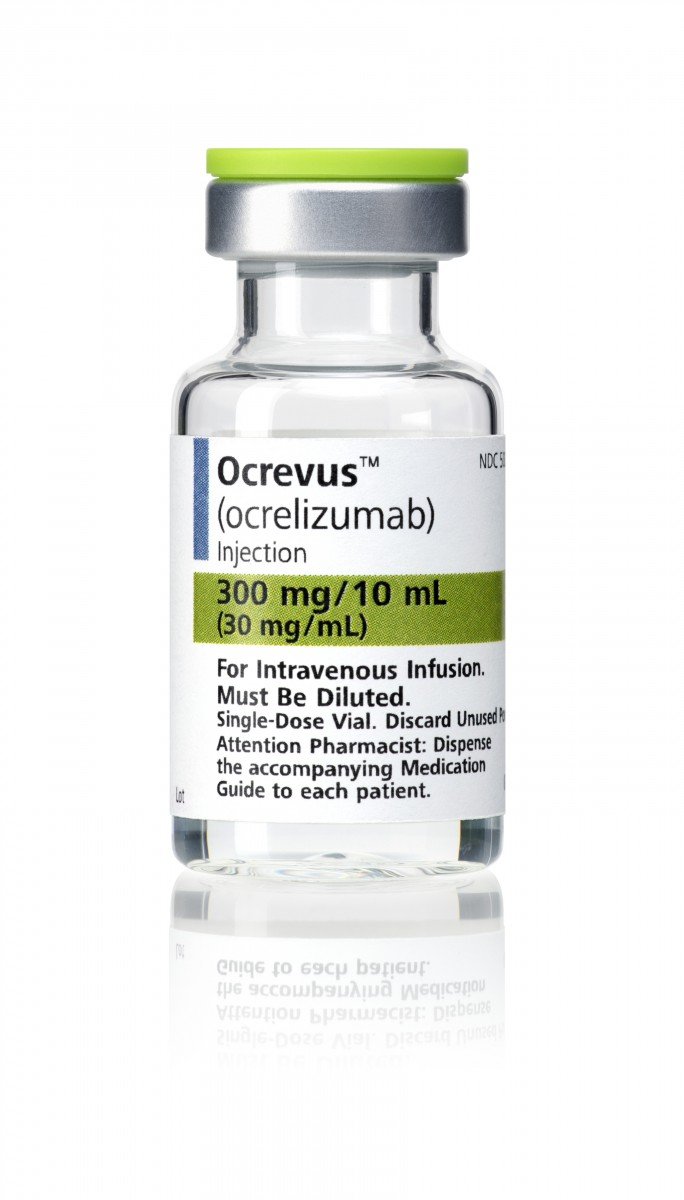Ocrevus and Me
Written by |


I’ve done it! I made the treatment switch that so many people with multiple sclerosis are talking about: I said goodbye to Tysabri (natalizumab) and am now on Ocrevus (ocrelizumab) as my disease-modifying therapy (DMT).
I went through 56 monthly infusions (or maybe more, I’ve lost track) with Tysabri with very little problems, and these regular trips to the MS clinic at OhioHealth Neuroscience Center, about 65 miles from my home, had become part of my medical routine. About 18 months ago, the routine screening of my blood showed that I had converted to being JC Virus positive, a risk factor for progressive multifocal leukoencephalopathy (PML), a rare condition. Being JC Virus positive was not a big concern to me because my numbers remained relatively low. But it was a contributing factor to making the change to a different therapy.
Fortunately for me, my MS neurologist, Aaron Boster, MD, believes in treating MS as aggressively as the patient is willing to undergo, and after several conversations, we came to the shared decision to make this change. It’s important to note that not everyone will want to try Ocrevus for their MS and may want to remain on whatever DMT they are currently taking. Only by talking about this with your neurologist can you decide if it’s right for you. I have been talking about this with Dr. Boster for over a year while we waited for the FDA to approve Ocrevus.
This change of therapies was not a difficult choice, even though my annual brain MRIs showed my MS was relatively quiet with no active lesions. I continue to have a slow decline in physical functioning. I have this trifecta of complicating factors: multiple sclerosis, aging, and inactivity due to fatigue and heat sensitivity. I can’t do a thing to stop my aging, but tackling the MS by being on an aggressive DMT might also help the problem of inactivity and is one thing I can perhaps influence.
Ocrevus works by targeting B-cells while all of the other DMTs work with our T-cells, making it a novel approach to treatment. Ocrevus is delivered through two separate intravenous (IV) infusions spaced two weeks apart. I have completed this part. After this initial treatment, I will return every six months for the next infusion. It will be a different routine for me, not making a monthly trip for my MS drug.
The process of being approved for Ocrevus by my health insurance provider and being contacted by Genentech Roche, the manufacturer of this drug, for my inclusion in their patient-assistance program was fast and seamless. I’m fortunate that Dr. Boster has an excellent and very experienced benefits coordinator who helps to make this process simple for their patients. Once I said yes to making the switch, they did all the rest of the work on my behalf.
I was also fortunate that someone else who had been scheduled to take Ocrevus for the first time had to cancel their appointment in mid-June, and I was contacted to see if I was available to fill the slot. I jumped at the opportunity. Otherwise, I would still be waiting for my appointment. The clinic has a lengthy list of people waiting for the next opening to begin Ocrevus at OhioHealth’s infusion center. The staff there sees as many patients a day as physical space will permit. Demand for this drug is high, as it is approved for the relapsing-remitting and progressive forms of MS.
In my next “Engaging Thoughts” column, I’ll talk with Dr. Boster about Ocrevus and share my experiences with my first two treatments.
***
Note: Multiple Sclerosis News Today is strictly a news and information website about the disease. It does not provide medical advice, diagnosis, or treatment. This content is not intended to be a substitute for professional medical advice, diagnosis, or treatment. Always seek the advice of your physician or other qualified health provider with any questions you may have regarding a medical condition. Never disregard professional medical advice or delay in seeking it because of something you have read on this website. The opinions expressed in this column are not those of Multiple Sclerosis News Today or its parent company, Bionews Services, and are intended to spark discussion about issues pertaining to multiple sclerosis.



Sheila Shoults
In ready your story, I thought I was reading my own. I'm right there with you step by step with the exception of getting on this new treatment. I want on it very much; my Dr is not so agreeable. Please let me know how you feel after being on it for awhile. Thank you and God Bless.?
Eileen Way
Hurray!!! I recently completed my first full (two part infusion two weeks apart) and my family could tell I was better after just the first treatment and my Geographic Tongue is gone!!!
Dell
Hi Eileen, curious to hear how you've been feeling. I start my first Ocrevus infusion tomorrow and am looking for some validation that it's the right step forward. :)
James Mc Loughlin
I have been on Tysabri for 9 years and hope to start Ocrevus when it's available in Ireland I'm also ncest positive just below the cut off point
BW
Thanks for sharing Laura. I hope Ocrevus works well for you!
Mike Spurgers
Has anyone had an improvement in MS related symptoms, like numbness, reduced motor function, etc.? I'm scheduled to start Ocrevus July 25, and have been cautiously optimistic about the possibility of improvement.
Jamss
I had my first treatment and I do feel improvement in every aspect.
peggy
have done 2 treatments of Tysabri and now they want to switch to this. since not much improvement. hope this helps me some.
Vicky
Any side effects?
poppy
LUCKY LUCKY YOU!!!!!
Here in Australia I still cannot access OCREVUS. I have organised a loan for $54,000 au for 2 treatments but my neurologist refuses to prescribe it. He wants to see me get worse before he will agree to it. We have few neurologist where I live, so I am stuck.
I am too tired to eat, to walk, to think. How I envy you over there in the U.S. I now just want to sleep (impossible) my life away. I am 55 with PPMS
Rachel Heinrich
Poppy,
My heart goes out to you. I'm 51 with PPMS.
I was on Copaxone injections for a year and then developed an allergic reaction. I've been on Tecfedera ever since (4yrs) with no improvement. It has taken roughly eight months to be approved for Ocrevus
I carry H core antibodies which means I've been exposed to Hep B
I've been on Vemlidy for several months to boost my immunity for Ocrevus
My first treatment is scheduled for Aug 15 with the second one on the 29th. I am hopeful that I will have positive results
I will be playing for you, that you too can receive this treatment.
Much love ~
Rachel
TH
Here in Australia as well, I started Ocrevus 3 months ago and feel really good. Have more energy, no fatigue and no other symptoms. I don't care if it's the Ocrevus working well or Placebo adding to the equation, but I feel great. Luckily my neurologist is absolutely great and I am so thankful
Vince S.
I had my first infusion today. Issues for me. (1) I was told I could drive home. I was very tired driving. Very dangerous. (2) Once I got home, I went to sleep. I had extreme chills and headaches. (3) When I woke up it felt like someone hit my arms and legs with a baseball bat. (4) My biggest issue was once I got up my arms and legs were very weak. I fell three times even with a cane. Ended up using a bar stool as a walker.
Vince S.
Update from my last post. All issues from my first infusion were gone the very next day. I was back to normal.
Patrick Sandoval
I'm glad to hear you are fine Vince. My girlfriend is so weak and well can get on it once I'm able to study and do a little reading on it. I hope all goes well for all of you.
Heather Hussey
Doc is suggest a switch to orcevus from tysabri. I've been on tysabri since 2008. High positivejcv titer. Any thoughts?
Cory Giles
I was on Copaxone for yrs, then tecferdera, and now octrevus. It appears to be the "far better" one for me. No side effects. Every 6 mos and ms staying at bay. I have RRMS. SO FAR SO GOOD???.
Fabi
Hi everyone from Switzerland,
i had Tysabri for 5 years and had a perfect life. Zero Symptoms most of the times. now i changed to ocrevus due to a positive JC titer just above the cut off. I felt good 2 weeks and now started feeling uncomfortable. No real relapse symptoms just fatigue and feeling „uncomfortable“ in my body... some old leasons i can feel back how when it started. My neueologist means it can go over and maybe its not full helping yet, but most of you guys say you felt perfect already the next day....
Any other experiences?
best regards, Fabi
Debbie Coulter
I have had MS since 2001.
I went through all the different Injections and then went on Tysabri.
I will be starting on Ocrevus soon after 10yrs of Tysabri. I have relapsing/remitting MS. I have lesions on my brain and spine. Weak in my lower extremities, use a cane. ?? that I will do well on Ocrevus but one thing I know for sure.
Everyone is different and that each can respond differently to each medication. I continue to try and be positive because I know that I serve a Big God and He is what gets me through????
Peggy
I’m waiting on my first shot , nervous but I’m just tired of being tired. I’m 39 and ready to see how this we’ll help me still have 3 children under 18 and I’m missing everything :( my life isn’t the same
Carol Homan
Hi Peggy, I start in 6 days. I too am nervous. Hope to get energy and motivation back. Best health to you!
Sharon Castro
I was diagnosed 6 weeks ago. I’m 46 with several lesions appearing on my brain, but had never had any flares until feb 2020, doc thinks I’ve had MS for decades. She is awesome, very aggressive with treatment. I had my first Ocrevus infusion a week ago, with almost no side effects. I have noticed an increase in my fatigue and a decrease in my strength the last few days, but maybe that’s temporary? I was super nervous about the DMT (I don’t love taking meds if I can avoid it) but am looking forward to treatment #2 in another week. My symptoms have been mostly sensory (pins and needles, burning) aside from a few migraines in the very beginning, but they are ongoing, changing daily if not several times a day...I just want to feel “normal,” like I did before, and I am hoping Ocrevus can get me back to that! Time will tell ☺️